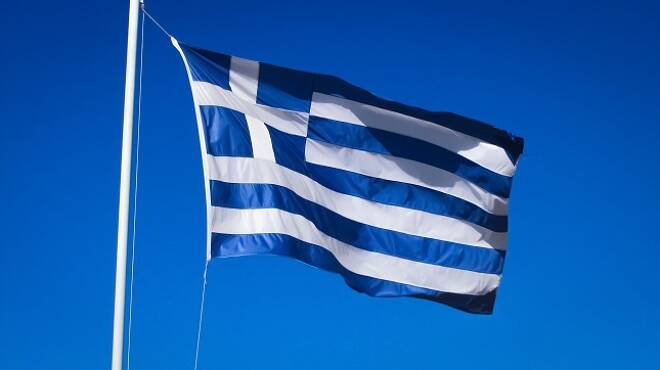Advertisement
Advertisement
Grexit is The New Brexit
By:
On February 7th the IMF board held a consulting meeting concerning the evaluation of the extended fund facility given to Greece from 2012. Disappointing
On February 7th the IMF board held a consulting meeting concerning the evaluation of the extended fund facility given to Greece from 2012. Disappointing outcomes caused temproray turmoil in the Euro and other derivatives. How to draw the lessons from the IMF announcements about Greece, and trade in efficiency during the similar times – this is going to be my focus during the article.
Historical Snapshot of The Crisis
Financial crisis in 2008 harmed all countries, but no one as much as Greece. Since 2008 till today Greece replaced 9 governments, GDP dropped to -10, unemployment rate soared to 25%, 13 austerity packages passed by the parliament. The Greek government asked the world for help; as a result, the European commission, IMF and WB formed tripartite committee called the TROIKA. The TROIKA mission was to fund Greece with sufficient funds, while imposing punch of economic reforms, which the state has to follow. The Greek parliament adopted 13 austerity packages included reforms on credits interests, tax system, pension cuts, privatization for public sector.
Last consultation
According to the IMF members’ agreement, the Board of directors consult with its members (Greek government) and issued a report summarizing the results. This year report seems to be much optimistic than previous years. Shortly, some of the positive points are:
- Greece has made significant progress, and doesn’t require more austerity.
- Greece expected to achieve surplus from 1% to 1.5% GDP over the medium and long term.
- The public dept are unsustainable.
- They expect the next consultation to be held after 12 months (and that is a very good point too).
- Fixing interest rates on Greece official loans as global interest rates normalized.
- Extensions of maturity dates and the probability of more European bailouts.
Also they mentioned that in order to put the economy on tracks again it should be accompanied by ambitious governmental policies which will lead to more European dept relief. On the other hand the board recommendations were seen as negatives, which were:
- Removal of exchange restrictions. Strict restrictions on foreign exchanges were imposed 2 years ago. In addition, restrictions on Euro withdrawal itself from the bank, and putting an 80 euro limit for ATM withdrawals.
- The board sees that more implementation on anti-laundring should be imposed.
- The legal framework regarding the dept restructuring should be reviewed.
But maybe the worst was a sentence in the release of the IMF on February 7th when they said ”Even with the full implementation of these planes, Greece cannot grow out of its dept problem”. So the idea of being inside the problem with the fact that Greece has to refund 8 billion Euros to creditors next August made a very bad reflection on the markets.
On February 13, Germany announces that they wish to Complete Greek Program with IMF. German foreign ministry spokesman Schaefer confirmed that Germany’s goal still is to complete the Greek bailout program with IMF participation and to keep the Eurozone intact. Meanwhile Merkel’s spokesman Seibert said Greek reform needs must be clarified with the institutions.
Markets reaction
Since the beginning of Greece crisis in 2009, EUR/USD and USD/JPY were the first pairs to be affected with any bad news. The reason was known later in the form of the Goldman Sacks’ scandal by giving Greece the advice to hide the real debts by cross currency swaps. That kind of long term trades caused the deception of traders, which was translated into the form of loses. Between the period of November 2009 to May 2010 the EUR/USD was the biggest loser by 3000 pips (within 6 months), while EUR/GBP lost 1000 pips, EUR/AUD lost 2000 pips, EUR/NZD lost 2500 pips, EUR/CAD (unrecovered), EUR/CHF lost 1000 pips. In the next EUR/USDS chart you can see how much they were affected by that period.
Once the IMF announcement released the EUR/USD dropped sharply. Despite the tumbling of the EUR/USD, we have seen different reactions for the Euro. For instance EUR/GBP, EUR/AUD, and EUR/NZD are trading choppily after these announcements, EUR/CHF get bullish. This notice should be identified as decoupling, gives the red alarm for what called the currencies war.
Other point I want to highlight (which is the lesson here) for those who focus plainly on fundamentals and ignore the technicals completely, technicals are formed by professional fund managers. When we look at the EUR/USD 4 hour chart we will understand that markets knew something. It was expected that the IMF is going to consult about Greece in the beginning of every year and that is why the markets formed rising wedge starting from January.
conclusion
- Greece crisis is to be continued, with a current stable situation.
- Technicals cannot be separated from fundamentals
- There are two types of fundamentals, a) open talk news [i.e. Greece negotiations], and b) very conservative talks [i.e. FOMC meeting minutes]. In the first type you can find charts reacting for enough period of time prior the event, which reflects the sophisticated experts’ opinions and can give you very clear signals. Meanwhile the second type can react only couple of hours at most prior the event, and you cannot rely on it.
For more on the EUR/USD and other derivatives in-depth analysis, check the technical division on FXEmpire.com
About the Author
Mohamed Fathallacontributor
Advertisement
